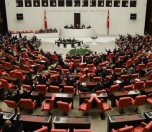Click to read the article in Turkish
The first package of judicial reform has been approved by the parliament. It includes amendments on various laws including criminal laws, criminal proceedings and restrictions on passports.
CLICK - Judicial Reform Package on Pre-Trial Detention, Freedom of Expression Passes in Parliament
The much-debated article that says expressions of thought that do not "cross the limits of reporting" and that are "for the purpose of criticism" do not constitute an offense was also added to the Anti-Terror Law.
With Article 251 titled "Simple Proceedure" that was added to Law No. 5271 on Criminal Proceedings, the penal courts of first instance are authorized to "run the proceedings through petitions."
Plea bargaining, one of the most controversial practices in the US that leads to wrongful convictions, is also included in the package. The practice is called, "rapid judgment". Accordingly, the prosecutor or law enforcement officers will inform the suspect. If the suspect accepts the rapid judgment, the prosecutor will determine a sentence between the upper and the lower limits of the offense and half of that sentence will be applied.
Did the period of arrest change?
It is claimed that the period of arrest for offenses within the scope of the Anti-Terror Law is reduced. But according to the approved bill, the maximum period of arrest will be two years in the investigation stage. Once a lawsuit is filed, the period of arrest can be extended to five years, which is the current upper limit.
According to paragraph 4 that is added added to Article 102 of Law No. 5271 on Criminal Proceedings, "the maximum period of arrest will be one year and six months for offenses against the security of the state, the constitutional order, the functioning of the constitutional order, national defense and state secrets, for espionage, for offenses that are within the scope of the Anti-Terror Law, and for collective crimes. Providing a reason, judicial bodies will be able to extend the period of arrest for these offenses for six months."
Therefore, the period of arrest is limited to two years in the investigation stage. However, in most cases, the indictment is prepared and the trial stage begins within two years, which means the period of arrest does not actually change.
In the reform package, the period of arrest during the trial stage does not change and remains as five years.
Prof. Dr. Adem Sözüer, the Head of the Department of Criminal Proceedings at İstanbul University Faculty of Law, said on Twitter that "With de jure arrest, the periods of arrest will extend even further."
Administrative bodies to decide if a person can receive a passport
There is also regulation for those whose passports were restricted because of their dismissals from public office upon statutory decrees in the period of the state of emergency.
Accordingly, their passports will be returned to them if the administrative or judicial proceedings end in favor of them.
Those whose passports are canceled or those whose request to receive a passport was rejected will be given a passport by the Ministry of Interior "according to the result of the investigation that is conducted by the security forces."
However, the following conditions will be sought to give those persons a passport: There should not be an ongoing administrative or judicial investigation against them, there should not be an ongoing prosecution against them, there should be a verdict of acquittal, non-prosecution, dismissal of actions on them, or the sentence given to them should be either fully executed or deferred.
So, to receive a passport, one must go through a police "investigation" and there should not be an investigation opened against them b a prosecutor. Prof. Sözüer said that this part of the package is against the Constitution as "an administrative body decides if an acquitted person can receive a passport and prosecutors make judgments as if they are judges." (AS/VK)















